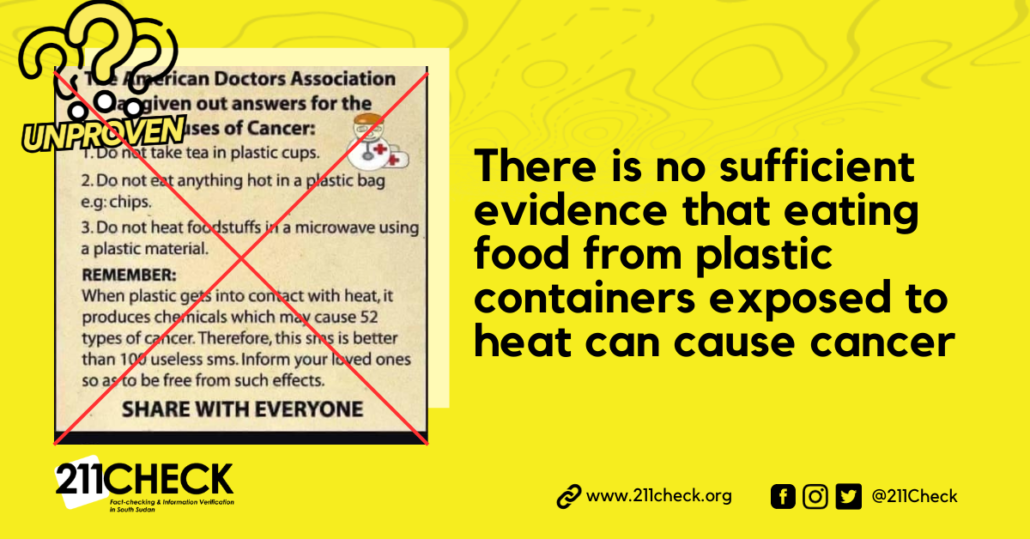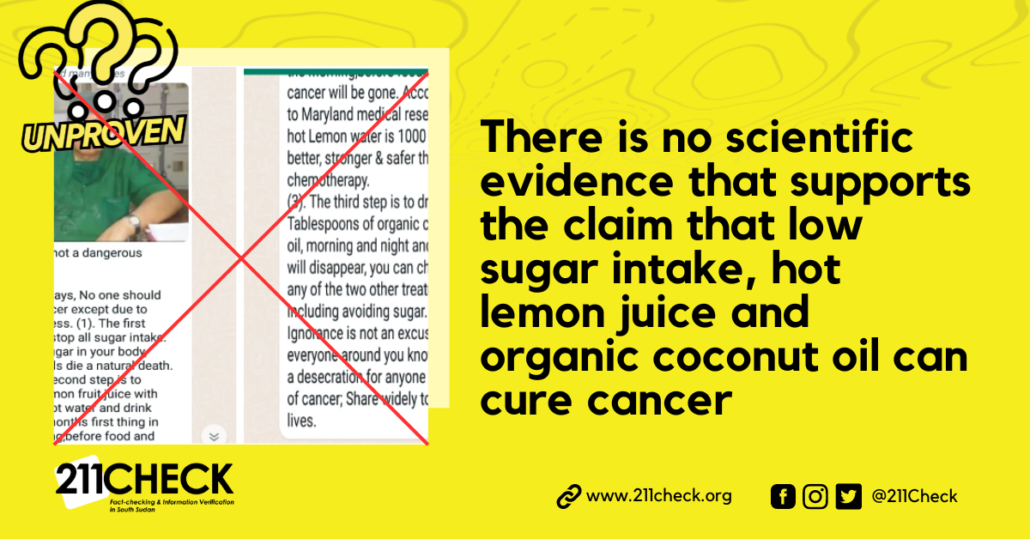Fact-check: Does eating food heated in plastic containers cause cancer?
No, there is no sufficient evidence that eating food from plastic containers exposed to heat can cause cancer.
Writer: Beatrice Amude Paulino
An image circulating on WhatsApp claims that, according to the American Doctors Association, consuming food from plastic materials exposed to heat can cause cancer.
The message states that you should not take tea in plastic cups, eat anything hot in a plastic bag, or heat foodstuff in a microwave using plastic materials. It cautions
that ‘when plastic gets into contact with heat, it produces chemicals which may cause 52 types of cancer.’
The message ends with a call to action: “Therefore, this SMS is better than 100 useless SMS. Inform your loved ones to be free from such effects. Share with everyone.”
Screenshot from the WhatsApp image
The same claim was also shared on a website called America’s Best Pictures and Videos, which adds that plastic materials can cause cancer cells to grow in the body.
Verification of the American Doctors Association page and website
According to a Google Search, there is seemingly no organisation by that name, which suggests it does not exist. Instead, existing organisations include the Association of American Physicians and Surgeons and the American Medical Association.
According to Cancer Research UK, an independent cancer organisation in the United Kingdom, drinking hot tea in plastic cups cannot cause cancer. Additionally, using plastic does not increase the risk of cancer, and it is safe to drink from plastic bottles, use plastic containers, cling film, and store food in plastic bags.
Cancer Research UK also added that even when plastics are heated for hours, studies have shown that the food inside remains safe.
Other studies, here and here, indicate that drinking hot tea can increase cancer risk. However, the studies do not mention the increased risk of consuming tea from plastic cups.
Plastic materials are everywhere in our homes, such as plates, baby feeding bottles, cutlery, food containers, fibreglass, water coolers, etc.
According to Doctor Ashwini Kumar Setya, a senior consultant in Gastroenterology and Hepatology at the Gastroenterology Institute of Digestive and Hepatobiliary Science, Gurugram- India, when hot food is kept in plastic material, it can produce a chemical which is not scientifically proven to cause cancer.
“…And some of these chemicals, like Bisphenol-A (BPA) and phthalates, might do strange things to your body, mimicking and disrupting hormones in ways that even scientists haven’t fully understood,” Dr Ashwini K. Setya said
In an interview with 211 Check, Dr. Catherine Naliaka Nyongesa, a physician radiation oncologist and CEO of Texas Cancer Centre, Nairobi, explained that no substantial literature supports the claim.
She disclosed that: “I think more research is needed to provide evidence to support such claims.’’
According to the FDA, there are plastics labelled for microwave use only that are safe to use. The Canadian Cancer Society (CCS) has also advised that people can use glass, ceramic, plastic containers and plastic wrap labelled for microwave use.
Further instructions include:
- Always follow the label’s instructions when using microwave-safe containers to heat food.
- Never heat or store food in plastic containers not intended for food. Single-use containers, like margarine tubs, tend to warp or melt in the microwave. This may allow more of the substances in the plastic to leach into the food.
- Let food cool before adding it to a plastic container, then put it in the fridge immediately. Avoid plastics that are visibly damaged, stained, or have a bad smell.
Conclusion:
According to investigations by 211 Check, scientific evidence suggests that certain chemicals can be leached into food from plastic materials. However, the amounts and potential health risks of these chemicals remain unconfirmed.
Hence, it is vital to choose plastic bags or materials specifically designed for food and labelled as safe by the Food and Drug Administration (FDA) and follow the manufacturer’s instructions on how to use them.
This fact check was published by 211 Check with technical support from Code for Africa’s PesaCheck newsdesk through the African Fact-Checking Alliance(AFCA).
To ensure accuracy and transparency, we at 211 Check welcome corrections from our readers. If you spot an error in this article, please request a correction using this form. Our team will review your request and make the necessary corrections immediately, if any.
It’s vital to fight misinformation and disinformation in the media by avoiding fake news. Don’t share content you’re uncertain about. False information can harm and mislead people, risking their lives—Fact-check before sharing. For more details, visit https://211check.org/ or message us on WhatsApp at +211 917 298 255. #FactsMatter.



